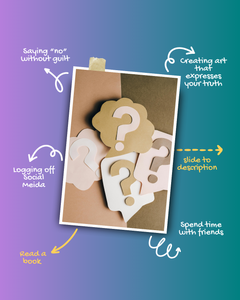April is Sexual Assault Awareness Month (SAAM)
- Nathan Sharp
- Apr 21, 2025
- 4 min read
April is Sexual Assault Awareness Month (SAAM) — a time to raise our voices for survivors, challenge harmful myths, and reimagine a world where safety, healing, and justice are accessible to everyone. But for LGBTQ+ people, that vision must go beyond awareness — it must be intersectional, inclusive, and deeply rooted in care.
Throughout this month, we’re spotlighting how sexual violence impacts LGBTQ+ communities and how we can support survivors through truth-telling, resource-sharing, and collective healing.
✋ What Is Sexual Violence?
Sexual violence includes any sexual activity where consent is not freely given. That means rape, attempted rape, unwanted touching, harassment, coercion, and more. It also includes subtler forms of manipulation — like threats of "outing" someone or disregarding a person’s gender identity.
No one “looks” like a survivor. People of all genders, sexual orientations, races, and abilities experience sexual violence. For LGBTQ+ people, the risk is often even higher — compounded by societal stigma, erasure, and systemic barriers to support.

🛑 Busting the Myth: “Only Women Experience Sexual Violence”
This myth is not only false — it’s harmful. According to the CDC and LGBTQ+ advocacy organizations:
Nearly half of bisexual women have experienced sexual violence in their lifetime.
1 in 4 gay men and nearly half of transgender people will experience sexual assault.
LGBTQ+ survivors often face disbelief, minimization, or rejection — especially when seeking help.
👉 Reality check: Sexual violence can affect anyone. And support must reflect everyone’s lived experience.

💚 You Deserve Support
Healing isn’t linear. And it isn’t something anyone should have to do alone.
If you or someone you know has experienced sexual violence, there are real people ready to help — confidentially, compassionately, and without judgment.
📞 National & LGBTQ+ Affirming Resources:
RAINN (National Sexual Assault Hotline) – 1-800-656-4673 | rainn.org
The Trevor Project (LGBTQ+ Youth) – 1-866-488-7386 | Text “START” to 678678
Trans Lifeline – 1-877-565-8860 | translifeline.org
InclusiveTherapists.com – LGBTQ+ affirming therapist directory
FORGE – Trauma resources for trans/nonbinary survivors | forge-forward.org
Reaching out isn’t weakness. It’s survival. And you deserve to be met with care.

🌿 Self-Care Is Survival
Self-care looks different for everyone — and that’s okay. For LGBTQ+ survivors, it might mean:
Logging off social media to reset
Creating art or journaling to release what can’t be said
Reconnecting with queer joy and chosen family
Setting firm boundaries with people who don’t honor your healing
Simply surviving the day
🌈 Whatever your version of care looks like today, it’s valid. You are allowed to rest. You are allowed to heal.
✅ Consent Is More Than a Buzzword
Consent is the foundation of safety and respect — and it’s not just for sexual situations. It's how we move through the world with each other in mutual care.
Real consent is:
Freely given – no pressure or manipulation
Reversible – a “yes” can become a “no” at any time
Informed – everyone knows what they’re agreeing to
Enthusiastic – no “I guess,” only clear and comfortable yeses
Specific – saying yes to one thing doesn’t mean yes to everything
💬 Let’s normalize asking, checking in, and honoring boundaries — every time, with everyone.
🧠 Mental Health Is Health
Sexual violence impacts more than just the body. It can leave deep emotional scars — including anxiety, depression, PTSD, and shame. Mental health support can be a lifeline, but LGBTQ+ folks often struggle to find affirming providers.
That’s why we lift up:
NQTTCN – National Queer and Trans Therapists of Color Network
You are not “too much.” You are not alone. And you deserve help that sees you fully.
💬 Seeking Professional Help Is Brave
Starting therapy doesn’t mean you’re broken. It means you’re honoring your own healing. Whether you meet weekly with a counselor or just want someone to help sort through the fog — support is out there, and it’s worth finding someone who understands your journey.
➡️ Pro tip: You don’t have to commit forever. It’s okay to shop around. It’s okay to take your time. It’s okay to start small.
✨ Healing doesn’t mean forgetting. It means moving through pain with support — and rediscovering your power.
⚖️ Why Intersectionality Matters
Some survivors are more likely to be ignored, disbelieved, or underserved. A Black trans woman, an undocumented nonbinary teen, a queer disabled survivor — each faces different obstacles and dangers. That’s where intersectionality comes in.
Coined by scholar Kimberlé Crenshaw, intersectionality is the framework that helps us understand how systems of oppression overlap, and how survivors at the margins experience compounded harm.
🎯 When we build support systems, we must center the people most often left out. Because justice for some is not justice at all.
💥 Take Action. Share Resources. Build Safer Communities.
SAAM isn’t just about one month of posts. It’s about deepening our commitment to care — for survivors, for each other, for a future free from violence.
✅ Learn the signs.✅ Believe survivors.✅ Advocate for inclusive policies.✅ Speak out against jokes, victim-blaming, and erasure.✅ Share this post — you never know who needs to see it today.
Together, we can build a culture where healing is possible, justice is accessible, and no one is left behind.
#SAAM2025 #LGBTQSurvivors #YouAreNotAlone #ConsentCulture #HealingIsJustice #IntersectionalityMatters #MentalHealthIsHealth



























Comments